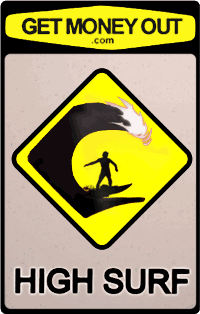So much for capitalism on Wall Street. Like any other group of businesses, there is strong resistance to any government regulation, but considerably less resistance to a bail out when it's inevitable that the CEOs have blundered and endangered the entire economy.
According to those who amass such statistics, the American public opposed a bail out of Wall Street by 99 to 1. After the president, the Fed. chief and the Secretary of the Treasury explained to the public the severity of the situation, those opposed dropped from 99 to 90. One California congressman said that his e-mails and phone calls were running 300 to 2 in opposition. This is because there is probably no other group in our economy that would be likely to be on the receiving end of such a huge bail out except the financial sector.
Forget the fact that the cause of this problem is attributed to several factors:
A. The lax standards for mortgages – no doc. loans, ARMS with no right of pre- payment, 125% loan to market ratios, etc.
B. Arcane and complicated instruments surrounding these mortgages.
C. Exceptionally low interest rates for a long period of time.
D. The repeal of Glass-Steagall. (The Banking Act of 1933)
E. Mark to market accounting.
F. Exceptional leveraging by many institutions, and more.
The American public knows little about these factors. They do know, however, that this mess was caused primarily by greed and avarice, coupled with a great deal of incompetence on the part of the executives involved. They also know that these executives are not held responsible for their actions, but are, instead, handsomely rewarded by contracts they negotiated with very friendly Boards of Directors.
Carl Icahn (the ultimate raider) likens the bail out to a laboratory run by mad scientists who concoct a batch of chemicals, which when united, blow up the building. After the dust settles and the debris is hauled away, the laboratory is back in business with the same mad scientists in charge.
If one likens it to an addict, there are even those on Wall Street who think that we should keep feeding the addict (Wall Street) more uppers. But, allowing the addicted ones to withdraw with all the necessary pain could be a better course to follow.
The smart people who set our fiscal and monetary policy may be making a huge mistake by not letting the market forces take hold and run their course. There is much debate that the constant tinkering and intervention during the Great Depression, in fact, only served to prolong the Depression making it last for 12 long years (See The Great Depression in the United States from a Neoclassical Perspective - Cole and Ohanian).
ANNOUNCEMENTS
No recent announcements.
Thursday, October 30, 2008
Subscribe to:
Posts (Atom)








